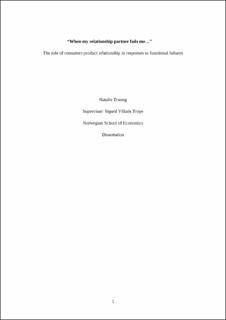| dc.description.abstract | This research examines consumers’ responses to a functional failure with an ambiguous cause. Empirical evidence shows that following a functional failure which involves a product service bundle (PSB), the consumer’s relationship with the product component tends to bias evaluations of the two PSB components. While evaluations of the product and service component are both adversely affected by the functional failure, the consumer-product relationship determines which component was more negatively affected by the event. The present research decomposes relationship into two related but independent facets, one of which is the affective component of relationship, namely emotional attachment, and another that is the cognitive element, which is relationship norms. We show that a high level of emotional attachment to the product component (versus service component) in fact leads to higher degree of ‘decay’ in product evaluations (versus service evaluations) following a functional failure. Moreover, the higher the emotional attachment to the product component, the more negative the responses towards the product component were. From the perspective of relationship norms, this research borrows the relationship framework from Clark et al. (1998) and examines three types of relationships with ensuing norms, including exchange, certain communal, and uncertain communal relationship. We found that among the three relationship types, regarding the product component as a partner in an uncertain communal relationship (e.g. a friendship) leads the consumer to reduce their evaluations of the product the most. We further examined the underlying processes of the effects, and showed that the emotion of disappointment causes people with high product attachment to evaluate it worse. A cognitive process, namely disconfirmation, could explain for the highest ‘decay’ of product evaluations when norms of an uncertain communal relationship follow. We test the conceptualization across three studies. Study 1 and 2 examine the role of emotional attachment, an affective facet of relationship in responses to product failure. Study 3 investigates the role of relationship norms, the cognitive component, and consumers’ downstream behaviors including coping | en_US |
